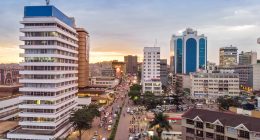Editor’s note: this article is part of the “Covid-19 Reset” project, where the LéO Africa Institute is asking its fellows and associates to imagine a new, progressive post-covid world for our respective communities and countries.
***
The current coronavirus pandemic, borne out of a live animal market in Wuhan, China, has caused a significant crisis globally and continues to threaten many lives across the globe. Millions of people have been quarantined and travel suspended with numerous lockdowns. Unlike other pandemics, the coronavirus comes at a time when the world is already grappling with climate change. While countries across the globe have chosen nationalistic approaches to tackle the coronavirus pandemic, unfortunately, this approach will not work when it comes to the worst pandemic of our generation—climate change.
There is a clear contrast between the two pandemics in terms of time. For instance, climate change has a gradual timeline and the magnitude of impact keeps building up over time. There is no direct line between taking action and seeing change as we see with the coronavirus pandemic, which is a short time, immediate and the impacts of which action are easily felt.
Humanity, however, is always ready to deal with short term, clear and present dangers like coronavirus and less able to tackle multi-decade problems like climate change. This has highly contributed to the different approaches to the two crises. We notice extreme weather conditions, flooding, air pollution that has been estimated to cause 4.5-7 million premature deaths every year, but such information goes unnoticed and may never make headlines. There is no strong political will to collectively tackle such a crisis. Various business people, politicians and companies have continued to create counter campaigns, doubting the science. and denying evidence and research.
In 2016, countries signed the Paris Agreement to define specific actions to stir climate action at the country level. For example, Uganda created a Uganda Green Growth development strategy and signed the partnership plan for the Nationally Determined Contributions (NDCs) to achieve national climate goals as part of its obligations to the Paris Agreement.
The plan was a commitment to achieve the country’s commitment to green growth, sustainable development, and a low carbon future. Unfortunately implementing these actions has been a very big challenge to not only Uganda but all developing countries in terms of climate finance. The emergence of the coronavirus has further exerted immense pressure on budgets of wealthy nations and there might be a slowdown in contribution to honouring their commitments to financially support Least Developed Countries’ (LDCs) efforts to combat climate change. The intergovernmental panel on climate change report asserts that we have until 2030 to make a tremendous emission cut. Inasmuch as many argue that this is impossible, we have already witnessed the effectiveness that collective action and structural change during a crisis can bring, and this has proven that the rapid emissions reductions called for in the IPCC report are not a nightmare. They can and are already happening.
There is a lot to learn from our COVID-19 response to prevent millions of future deaths caused directly by the continued burning of fossil fuels or indirectly through the negative effects of a hot planet. We need to act quickly to create rapid and drastic structural change and treat climate change like it really is: a crisis. If we don’t act in this way, the effects of a hotter planet will be much worse than the current pandemic, and countries in the global south continue to be at a high risk of feeling the worst impacts of climate change.
The coronavirus response has shown us a path forward, we must have the courage to break from the status quo and go down it. This is also the right time for policy makers to have a workable plan to lower emissions. The answer to the climate change pandemic is not to quarantine everyone in their homes, the coronavirus has made many countries aware of the things they can do to lower emissions and not to go back to the old way of doing things. More attention should be put towards preventing the worst pandemic from happening, and as such, a concrete road map towards green recovery should be highly considered. Countries should invest in clean technology, introduce car-free busy streets, embrace work shifts to reduce traffic, construct bike and proper walking lanes to ensure a just recovery. If the climate crisis is handled the same way the coronavirus is being handled, the future of the planet will be brighter, and we will be on our way to a zero-carbon future.
Joanita Babirye is a Class of 2017 Young and Emerging Leaders Project (YELP) Fellow of the LéO Africa Institute and the Team Lead at Girls for Climate.









